 |
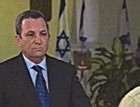
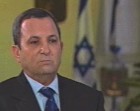
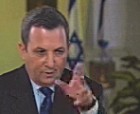
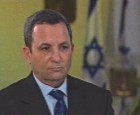
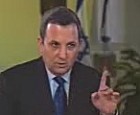
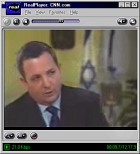
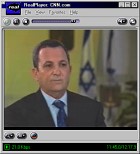
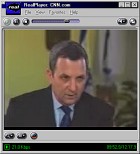
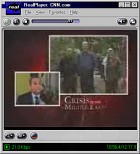
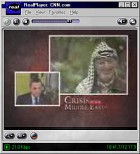
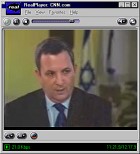
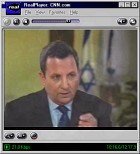
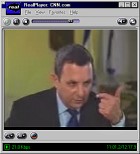
|
AMANPOUR: Prime Minister Barak, you have
just finished saying that this was a limited action, that you did not target
Palestinian Authority President Yasser Arafat. But you have never -- Israel has
never taken this extensive action against the Palestinians. How do you expect
them to react?
BARAK: I expect them to put an end to
violence that they have initiated and are responsible for. We have this morning
-- we had a lynch of three Israeli reservist soldiers; people came from the home
and were lynched, then mutilated and burned. It's something that no government
on Earth could accept, and Israel is ready to look open- eyed at the situation.
Understand that we are living in the Middle East, not in North America and not
the Midwest, and this is a place where you cannot expect anyone to respect you,
you cannot expect your own people to trust you if cannot respond to such an
event. And we responded in a very focused manner, very clear signal that we will
not have this kind of violence continue forever.
AMANPOUR: Mr. Prime Minister, this looks
like an argument that is spinning out of control, each side blaming the other
for what's going on, each side saying that the other one has to stop. Isn't it
time, Mr. Prime Minister, to show leadership, to stop this?
BARAK: We have stopped it some hundred
times since it began 10 days ago or 12 days ago. We are ready all along the way
to stop it. We are not creating the provocation, we are responding, and we will
keep responding. Unfortunately, you cannot let your neck be kind of cut as a
gesture for your neighbor, even if it's a good neighbor.
AMANPOUR: Would you acknowledge, Mr.
Prime Minister, this kind of heavy weaponry, this kind of offensive action,
simply plays into the hands of the extremists on both sides?
BARAK: I say, first of all, it's a
necessity. We cannot avoid it. It's the role of a government to defend its
soldiers and its citizens. We did it in a way that did not cause casualties.
There are few people wounded. We made clear to announce in advance what kind of
headquarters we are going to attack. We made clear that every place we approach,
first of all, we signaled with few shots that something is happening so everyone
can go out and then we hit it, so that there are very few wounded people, much
less than in every daily demonstration where the Palestinians in their terrible
way of sending people with weapons, innocent citizens, and kids, together.
That's crazy.
AMANPOUR: Mr. Prime Minister, the
Palestinian Authority president says in fact there were several people killed in
attack, and there were dozens of people wounded. Nobody...
BARAK: I beg to kind of question the
level of credibility that this authority, the Palestinian Authority, has in
reporting effects.
AMANPOUR: Nobody would condone what you
described as the lynching this morning. But the Palestinians and the rest of the
world who are looking at the last two weeks know that the majority of the people
who have been killed -- nearly 100 people -- are Palestinians.
BARAK: Christiane, try to imagine that
you have a farm, it's attacked by rebels. You respond. Unfortunately, they are
trying to kill you respond. You kill five of them and one of your family was
killed. Is it fair to say that unless you will kill or let someone else kill
another four of your family, it's not satisfactory? It makes him, not just the
Hamas and Islamic Jihad, responsible for the following terrorist attacks that
might easily come. We have to be able to make it clear. It's like you have lost
today at the near Aden port four sailors and some, maybe 12, that disappeared.
When you try to ask yourself, what's that, is it something offensive that the
vessel had done? It's nonsense. Butchering is the intention of terrorists, to
take the life of Americans since you are standing firm for freedom and against
terror. And that's exactly what the world expects the leaders of the free world
to do.
AMANPOUR: But don't you think what you've
just done plays into the hands of that very activity? Don't you think that it
just encourages the push toward the extremist side?
BARAK: I tell you, to bury more Israel
does encourage them. There is no -- we are living in a neighborhood which is
somewhat different from the neighborhood you are living in. It's not North
America; it's not Western Europe. This is a place where there is no mercy for
the weak -- you can see it in the lynched soldiers -- and no second opportunity
for those who cannot defend themselves.
BARAK: Israel is determined to defend
itself. We have no hostile intention against anyone around us. We were ready to
go further than any previous government in Israel, be it Netanyahu or Shamir or
even Rabin and Peres, in contemplating ideas that will put an end to it. But if
we won't find a partner with the same determination and clarity of objective, we
will fight to defend ourself and our right to live in freedom in this part of
the world.
AMANPOUR: How can you talk about a
partner, how can you talk about peace, after the kind of activities that we've
seen over the last two weeks? Chairman Arafat and other negotiators have called
today's action tantamount to a declaration of war.
BARAK: That's nonsense, bullshit and
propaganda. It doesn't amount to anything. It was not one in millions in what we
can do if we are really in war. But it was a signal deliberately planned to
avoid even the loss of life of people in uniform of the Palestinian Authority,
but to signal to them that we know where their headquarters are, we know which
boat exactly are the kind of police boat of the Palestinians, we know exactly
where everything is and we will hit them if necessary. The Palestinian Authority
cannot hold the stick at both ends, to incite violence, to participate in it and
to tell the world how -- what kind of underdog they are.
AMANPOUR: You keep saying that nobody has
ever offered such a great peace agreement as you have. What have you offered
them? Nobody has said it publicly. We've heard leaks. We've heard things from
the Americans.
BARAK: You are not Palestinian, you are
not the negotiator. Arafat knows it. All his group knows it. President Clinton
knows it. And we know it. So we expect that if Arafat fails to take the ideas
raised by President Clinton, which are far-reaching, beyond what we can follow,
but we were ready to go there and negotiate and contemplate them if Arafat will
kind of will be unworthy, will refuse to take them as basis. I would expect the
American president, the American administration to look in the eyes of the
American people and tell them, "We have tried our best. The Israelis were
worthy. Arafat was not." It's something that I believe we deserve after going
together with United States seven years, taking them as the honest brokers
drafted by both sides. And we really expect it to happen in the very near
future. Whether he goes to the table or we expect the American administration to
tell loud and clear the American people and the leadership of the world: Who
failed to move forward in order to put an end to the bloodshed in the Middle
East?
AMANPOUR: You know, the leadership there
says that, in fact, we are no better off. There are more settlements built under
Prime Minister Barak administration. There's more stalling. Why is it that -- I
know you say that I'm not the negotiator -- but why is that you haven't taken
your offer to the people, to the Palestinian people?
BARAK: I suggest that CNN will take
certain excerpts of the material that has been broadcasted there and you will
make your own judgment together with your bureau.
AMANPOUR: Do you think in retrospect that
going to Camp David and wanting to make the grand gesture, that it was wrong to
have brought up Jerusalem then, that it simply touched too many emotional,
religious, symbolic buttons?
BARAK: No, it was a necessity. We could
not solve it without touching Jerusalem. It was decided upon 22 years ago in the
first Camp David under Carter, and then it was decided in Oslo, that when the
time comes to negotiate permanent status agreement, Jerusalem would be put on
the table. But we were ready when Clinton, President Clinton, raised it, that we
will take Jerusalem and delay, to defer it, or maybe even the Old City or the
Temple Mount, delay, defer it under certain terms of negotiation for a certain
mutually agreed period. We were ready even to do it, but the Palestinian were
not ready as they were not ready for anything else. I cannot have an explanation
for this, but I should tell our people and I expect the Americans to tell the
rest of the world the truth. We were there together. We were ready to move. We
were ready to make peace. But with the same determination that we decided not to
leave a stone unturned on the way to peace, we will fight for our right of
self-defense and the freedom and the right of Israelis to live as normal human
beings here in Israel.
AMANPOUR: There's so much anger. Do you
really think there is room to restart the peace negotiations?
BARAK: Yes. There will always be room. We
will never lose hope of peace. The Palestinian people is going to be our
neighbor forever, we will make peace with them. Leadership can change its mind,
leadership can open its eye, leadership can even be replaced. And we* might lose
trust and hope of this present leadership, but we will never lose the hope of
having peace with our Palestinian neighbor, the same people who are innocently
pushed or incited to go into these demonstrations.
AMANPOUR: If you call a national unity
government, peace is dead, isn't it, this peace process?
BARAK: The cause or the end result? If
peace is dead, I can see no reason why we shouldn't have a national unity
government if a conflict is imposed upon us. But let me tell you more than that.
I don't think that Likud or right wing Israel is against peace. They might have
certaindifferences with us about emphasize how to approach it, what's the right
approach, how to reach it, not just to talk about it, but they're not
anti-peace. I hope that the Palestinian most devoted supporters of peace will
behave like our right wing or even the extreme right wing. Our people want
peace, be it right or wrong, they want peace and security for Israel.
BARAK: And in my judgment, they are a 100
percent OK, kosher, for a national unity government in Israel to push peace if
Arafat is ready. But if he's not ready, let's face the reality, tell the truth
and move forward.
AMANPOUR: A few days ago, a couple of
days ago, your own forces -- and certainly it looked as though the violence was
decreasing. The Palestinians had prevailed upon the police and militia to stop
using their guns. The Israelis were moving back a little bit. And then* came the
settlers and started a whole new round of violence.
BARAK: That's not true. Christiane,
that's not true. There are two gentlemen in the West Bank. One of the called
Mawanba Gooti (ph), the other named Sena Sheik (ph). I told Arafat in front of
Madeleine Albright, I told Mubarak, I told Clinton, the only thing that could
immediately put end to violence is a clear-cut order from Chairman Arafat to
these two gentlemen to put an end to the violence. You know, when I approached
him and told him, "Mr. Chairman, in order to put an end to violence, please call
Mawanba Gooti (ph) and* Sena Sheik (ph) and tell them to stop the violence." He
looked at me as if I mentioned the names of two polar bears in a zoo that he
doesn't know. And it was until his own people could not stand laughing at this
kind of appearance that he said, "OK. I will do it." And I don't know whether he
has done it.
AMANPOUR: The settlers, though, are a
threat to the Palestinian people, people in the camps. Is it not your
responsibility to rein them in?
BARAK: Of course. Of course it's my role
to make sure, but it is not true that the settlers is a real threat. They can
become a threat. We try our best to control them. I would not suggest to anyone
to consider is their wife and little children going back home from work and
being attacked along the road by Palestinians, who got their weapons under an
agreement under -- signed by the nited States, signed by Israel and the
Palestinians, to be the weapons that would be used to keep public order within
the Palestinian Authority.
What we are doing is a shame for public
order of a legitimate leader who wants to be a head of state that will be
accepted by the world community as a normal member of this community.
AMANPOUR: I would just like to say that
it is quite scary seeing these people with guns walking around in the streets.
But beyond that, I want to ask you, do
you underestimate the level of passion that exists amongst the Palestinian
people, the level of frustration, emotion, anger, every single day going to
funerals, every single day being confronted with this -- with these killings?*
The level of emotion that that -- the killing of that little 12-year- old boy...
(CROSSTALK)
BARAK: I never -- I never underestimated
it.
BARAK: I called Chairman Arafat myself
and I told him that we share, while of course we mourn our own dead, we share
the feelings of the Palestinian people burying their own people. I mentioned
deliberately this young boy that shocked the whole world. I mentioned the son of
Mahmoud Aloul, the governor of Nablus, a person that we all know, and we share
his sorrow as human beings. But at the same time, we cannot deny the fact that
we know the sources, we know who initiated it and why. And we believe that the
Americans know it. We believe that certain other Western countries know it. And
we expect the leadership of the world to be able to look at the eyes of our own
public and tell the truth loud and clear. Since it's important for us when we
deploy our own people for quite a kind of a tough crossing of rough water, we
deserve this kind of gesture. It's much more than gestures here, it has to do
with moral leadership. We deserve knowing the truth and knowing it from those
who were intimately involved in the process from day one.
AMANPOUR: Whatever you say about maximum
restraint, about your necessity to defend, nothing is going to change what the
world sees here, and it sees a well-armed military force against civilians, some
of whom have guns, a lot of whom have stones. There is no parity whatsoever, no
matter what you say about it.
BARAK: I know...
AMANPOUR: So the question is, the
Security Council has condemned the excessive use of Israeli force. Even your
friends doubt the wisdom of this course of action. Why do you not accept, for
instance, an international commission of inquiry?
BARAK: Look, we accepted that the
Americans will nominate a group of people, Americans, under the
American-Israeli-Palestinian Authority source of authority, with even experts
from the UN or from the EU, the European Union, and so on. I believe there is no
problem of objectivity once it comes to an American-led fact-finding committee.
I've seen American independent enough to criticize their own institutions, even
their own president. I have not seen a lack of firmness on finding fact.
Unfortunately, Israel experience in the last 52 years many times where a direct,
simple judgments about reality were distorted for political reasons when it
comes to the kind of forums in the international bodies like the UN where member
states have kind of an alienation of blocs. Many of them are Muslim or Arabs or
in a kind of...
AMANPOUR: So you're saying it would be
biased?
BARAK: It's totally biased.
AMANPOUR: Are you saying no?
BARAK: Of course we say no. We say that
it should be an American source of authority, maybe with Israelis and
Palestinians, of course, but not international body. And we believe that this is
an understandable position bearing in mind our experience in this world in the
last 52 years.
AMANPOUR: How are you going to get out of
the situation that you're in right now, that the area is in right now? Are you
going to stop. Is there anymore action today planned?
BARAK: I hope every moment, even now when
we are sitting, you interview me, I hope that a way will be found to convince
Chairman Arafat to put an end to violence. Believe me, immediately, on the spot,
violence will cease.
AMANPOUR: They say exactly the same thing
about you.
BARAK: Yes, but there are some gentlemen,
the head of the CIA, or the head of the British intelligence agency, or many of
the world leaders and foreign ministers who are coming here, know the truth,
that we are telling the truth. But of course they try to find a diplomatic way
to manage with Arafat that made himself the kind of underdog of the world, this
heartbreak, the whole Arab communities. There are many sensitivities on this
globe for the Arab interests and needs and these motivate certain sensitivity.
BARAK: But these people, as human beings
and as leaders, know that we are telling the truth, period.
AMANPOUR: How is it possible, finally,
that after seven years of work, this can unravel so quickly? I mean, is there
really in your mind a chance that a fair peace can be achieved?
BARAK: You know, there is a chance, but
there should be a will. You know, Chairman Arafat always say, "If there is a
will, there is a way." So if we don't find now a way, maybe there is no will.
The will on our side, there is plenty of it. It's the hope and prayer of almost
every reason you can see. In the streets you can see it in the eyes of people.
You can see it in every place. But, unfortunately, maybe it's not yet right on
the minds of the leadership on the other side. And we will never lose hope, as
I've said, to make peace with the Palestinian people. They are our neighbors
forever. But if this leadership is unripe, we cannot impose it upon them. It
takes two to make peace. It takes only one to lead to confrontation. And if
Arafat wants confrontation, we cannot avoid it. I only think we can hope is that
the world leadership and Arab leadership and there are many other responsible
leaders around and will use their influence. They'll share kind of multiple set
of values with Chairman Arafat, to convince him this is the time to reach the
peace of the brave. The time is right, but he seems to be unright for the time.
AMANPOUR: On that note, thank you very
much for joining us, Prime Minister Barak.
BARAK: Thank you
haGalil onLine
15-10-2000
|